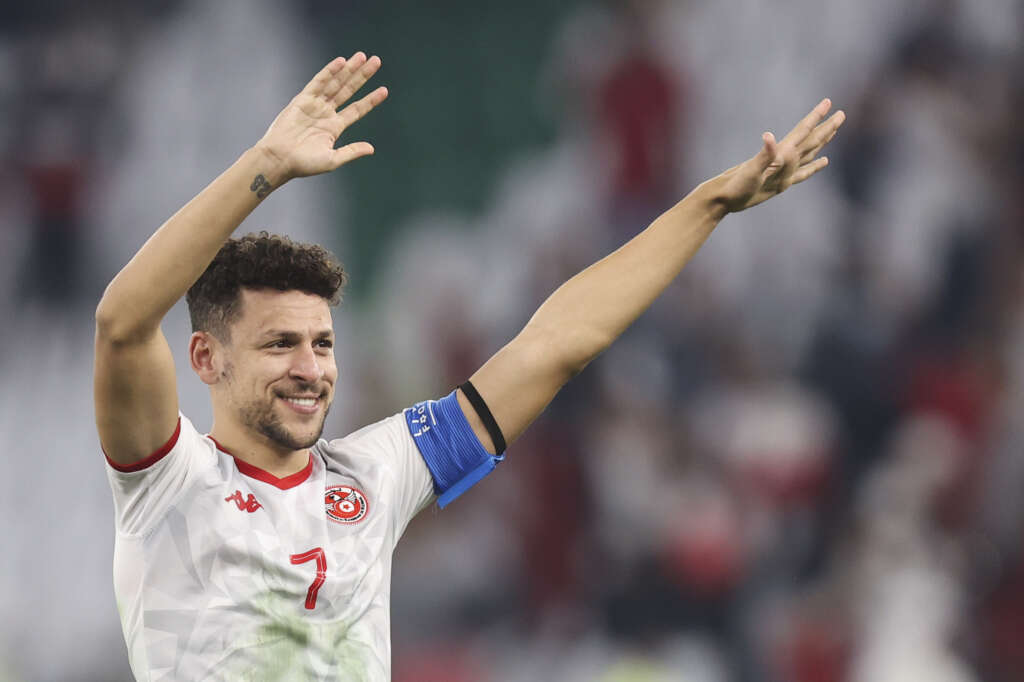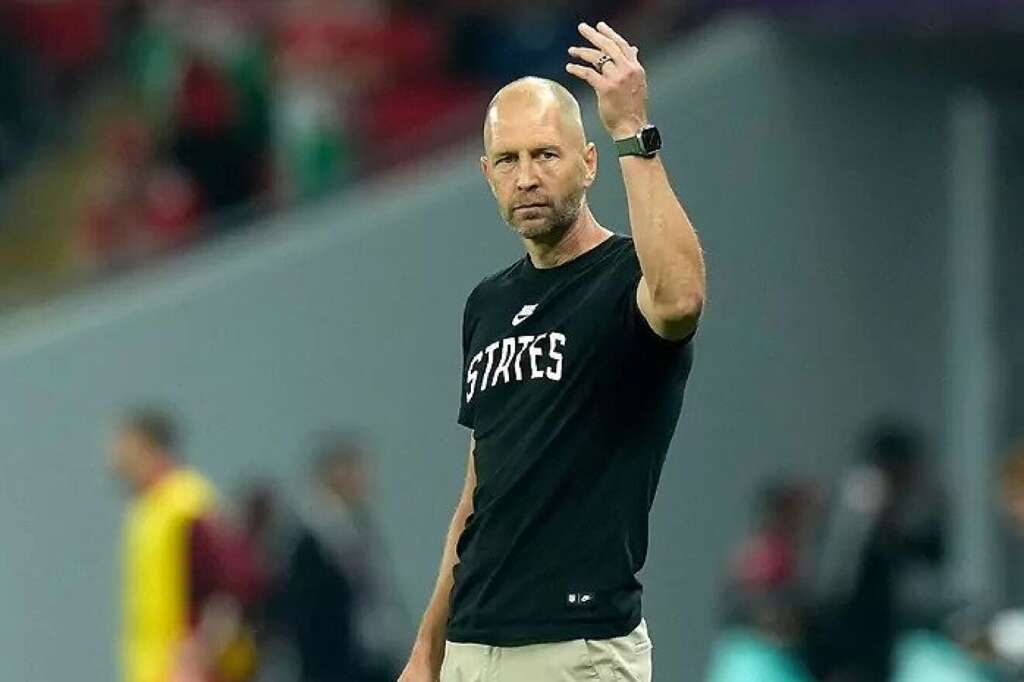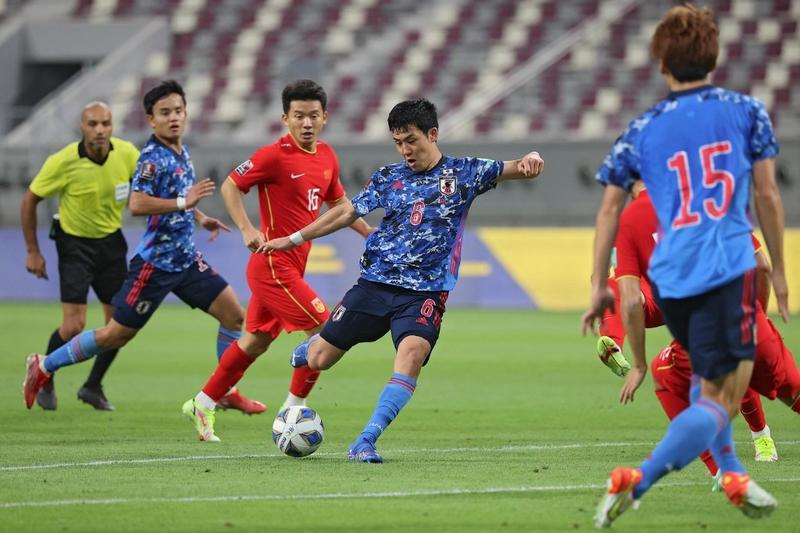

USMNT
Grouped OR GLORY: GROUP D
Published
2 years agoon
By
Karun Sagar
France | Elo: 6 | FIFA: 4 |
History: For some, there is a line. A line that separates brilliance from catastrophe. It is on this line that Les Blues resides. From the semi-finals in 1982 and 1986, to failing to qualify in 1990 and 1994. From Jules Rimet holders in 1998, to winless in 2002. From finalists again in 2006, to winless again in 2010. France enter Qatar, champions once more. Will disaster ensue?
Piped by England to soccer’s conception as a sport, France retaliated by spearheading the formation of the Fédération Internationale de Football Association(FIFA), the body responsible for governing football world-wide.
Unfortunately, despite helping codify international football as a concept, France wasn’t actually all that good at it, falling at the first hurdle, or failing to qualify altogether, for 10 of the first 12 editions of the Coupe du Monde. Then, in 1976, a host of new players, headlined by 3-time Ballon D’or winner Michel Plantini, made their debuts. 6 years on, France was in the semi-finals, losing to Germany on penalties in an all-time classic. In 1986, France returned, beating Italy – reigning champs – and Brazil – in another all-time classic – en route to a semi-final rematch against the Germans. Again, France would lose. And again, Germany would lose in the final.
Les Blues would have their day in Europe, winning their first major trophy against Spain, before adding to their collection with gold in the 84 Olympics, and a triumph in a precursor to the Confederations Cup. With three major trophies sandwiched between back to back semi-final runs, France had reached a new zenith. And then they failed to qualify. Twice.
Unable to reach the World Cup themselves, FIFA gave the French a spot as hosts. Les Blues, now led by one Zinedine Zidane, capitalized, lifting Jules Rimet after a dominant victory against reigning champion Brazil before downing the Italians to win a second European championship. And then, as the pattern goes, calamity ensued.
20 years on, France enter Qatar as champions, seeking to defy a trope their countrymen started.
Will history repeat itself? Or will Les Blues defy destiny?
Expected Finish: 2nd
Why?
While history is not destiny, it’s difficult to ignore 20 years of significant champion underperformance, when the current champion has significantly underperformed. France’s most recent underperformance involved being swept by the Danes. France have also lost key pieces to injury.
Still, the French boast a plethora of world-class players, and haven’t really done anything to warrant being rated lower than Tunisia or Australia; two teams who backed into the World Cup on thin margins and have been unimpressive continentally.
France should advance, but history, injury, and recent performance has me pegging Las Blues for 2nd.
Why not?
Ranking top 3 per TMV and WCDCS, France still has a case as the most talented team in the world, and player for player, no one in group D comes close.
Or maybe the French collapse all the way, finishing last like every champion has since 2002.
For what it’s worth, I think a first place finish is more likely than an exit.
Key Players
At 23, Kylian Mbappe is already being discussed as the potential GOAT. At 18, the young attacker burst into the scene at Monaco, leading his unfancied side to a Ligue 1 title and a semi-final finish in the Champions League. At 19, he was a World Cup winner. At 20, he was named the best player in France. Now 23, Mbappe has been dubbed Ligue 1’s best, three years in a row. With 29 goals in 60 appearances, including a tally in French’s triumphant final 4 years back, Kylian Mbappe is already the face of France. With a strong World Cup, he could be something more.
Aurélien Tchouameni joined the best club in the world this season. Less than half a season in, the 22 year old has already made himself indispensable. With star midfielders N’golo Kante and Paul Pogba absent, Tchouameni has become irreplaceable. A world-class defender and ball-progressor, capable of creating danger in the final third, Tchouameni could prove vital for a successful title defense.

Denmark | Elo: 9 | FIFA: 10 |
History: Here comes Danish Dynamite! Many people’s favorite pick for a surprise, Darkhorse Denmark enters the fray.
A “Denmark XI” first played in 1896, making Denmark one of the oldest national teams in the world. Denmark were actually quite good at the beginning, ranking 1st in Elo between 1912 and 1920 after winning two silvers from the 1908 and 1912 Olympics. The problem for the Danes was money. The Danish Football Federation(DBU), wasn’t very interested in international football, and didn’t want to foot the bill for soccer as a professional past-time. Thus many Danish players went abroad… and were promptly banished from the national team. Additionally, the DBU only sent teams for friendlies and the regional Nordic tournament until the 1948 Olympics where the Danes medalled once more.
Eventually, with many of their best players banished abroad, the Danes started to fall behind. A disappointing quarter-final exit in the 58 Olympics prompted the DBU to stop competing there. After more disappointment in the 60’s, the DBU took action in 1971, finally allowing Danish leagues to turn professional while lifting the national team’s ban on players who voyaged abroad. In 1979 the DBU hired Sepp Piontek as Denmark’s first professional coach. Within a decade, Denmark had assembled all the components they needed for an explosion.
Denmark exploded into international prominence during Euro qualification, being dubbed Danish Dynamite after beating England to qualify for the 1984 European Championship. The Danes would combust all the way to the semis, where they lost on penalties to Spain.
Denmark reached their first World Cup in 86 and opened with a bang, blasting the World’s first champion. In round two they face the Spaniards again and lost emphatically. Denmark would fully combust a couple years later, failing to qualify for the 1990 finals. Under Moller Nielsen, Denmark also failed to qualify for the 92 Euros, but were given a lifeline by a timely piece of warfare. War would pave a path to victory. Silver-medalists in 1912, the Danes were now the champions of Europe.
Winning Europe qualified Denmark for the 1995 Confederation Cup where they beat Argentina for a second piece of major silverware. The Danes went on to reach 5 more World Cups, memorably reaching the quarter-finals in the 98 edition.
Thus far, the 2022 cycle has gone well, with Denmark reaching the semi-finals of the Euros while going perfect in qualifying, save for a match which meant a lot more for Scotland. All the Danes need now is a strong resolution. Can the Danish deliver a strong World Cup? Or will the Danes combust?
Expected Finish: 1st
Why?
Denmark are significantly more talented than either Australia or Tusnia, have only ever failed to advance from the group stage once, and are currently ranked top 10 in Elo and FIFA because they’ve entered Qatar in excellent form. They are clear favorites to advance.
While France is vastly deeper and can field a significantly stronger lineup, Denmark have simply been better over the last 2 years. A lot of that was without their star player
All considered, I’m feeling good betting on some Danish delight.
Why not?
Denmark takes an unusual amount of risk when they attack. An over-eager foray from the wings may result in a speeding Kylian Mbappe breaking Danish hearts.
Australia and Tunisia are fairly experienced at grinding out results in big games, with both teams reaching Qatar on the backs of 0-0 draws against more talented opposition.
Denmark will want to avoid the fate of 2018 Poland, a red-hot European side that ultimately faltered when they encountered adversity. Denmark seems good, but the World Cup is hard and there are no guarantees.
Key Players
After nearly dying in the 2021 European Championship, Christian Eriksen’s return to professional soccer went incredibly well. Upon his arrival in 21-22, Brentford experienced an immediate uptick in form, going 7-3-1(W-L-T) with Eriksen on the field(they had a record of 5-15-6 without him). Denmark showed they could succeed without their superstar in 2021, but if Eriksen can do something similar for Danish Dynamite, the Danes may just pop off in all the right ways.
Pierre-Emile Höjbjerg has played every minute he’s been available for a Tottenham side competing to retain champions league qualification. A strong ball-winner who is reliable in possession, Höjberg has been Denmark’s most reliable metronome.

Tusnia | Elo: 43 | FIFA: 24 |
History: And now enter the Eagles of Carthage. Tunisia qualified for 6 World Cups, exiting in round one for 5 of them. Will their 6th entry end differently?
Before they gained independence, French protectorate Tunisia established an unofficial national team in 1928. Debuting against the b-team of their Colonial overlords, Tunisia lost by 6. Tunisia would need to wait until 1932 for their first unofficial victory, a 1-0 win over French Algeria. After gaining independence in 1956, Tunisia played their first official international against an independent Algeria. This time it was Algeria, in the midst of a civil war, who emerged victorious.
The 60’s brought a successful spell for the eagles who reached the final as hosts of the 1963 African Cup of Nations(AFCON). Tunisia entered the 1973 Palestine Cup of Nations and went perfect, winning six of six. Tunisia then qualified for the 1978 World Cup, eliminating old foes Algeria in the process.
Tunisia opened their debut with a win against Mexico, becoming the first African side to win at the World Cup. A close loss to the Poles proved fatal, but Tunisia exited impressively, holding reigning champion West Germany to a scoreless tie.
78 would prove to be Tunisia’s best performance at a World Cup. It would also stand as Tunisia’s only World Cup performance until 1998 when the Falcons of Carthage ushered in a new era by going undefeated through African qualification.
That success was foreshadowed by a run to the final of the 1994 AFCON. A remarkable achievement for a team that had failed to qualify for 6 of the prior 7 tournaments. Tunisia would reach another final in 96, before emerging as champions in 2004.
Outside of Africa, Tunisia managed to reach five of the seven world cups, finally notching their second win in 2018. After a difficult path to Qatar, the falcons have a chance to build from that base.
Can the falcons surprise?
Expected Finish: 3rd
Why?
Ranking 26th in TMV and 30th in WCDCS, Tunisia is one of the least talented teams at this tournament. They also reached Qatar unconvincingly, barely surviving a group with Equatorial Guinea – Ranked 93rd by Elo – before edging Mali(56) in a playoff.
Tusnia have managed a total of 2 wins in 5 campaigns, and with the 4th oldest team in the tournament, the eagles may well be on their last legs.
Why not?
If recent history holds true, France will be eliminated leaving two spots up for grab between Australia, Denmark and Tunisia. Tunisia ranks higher in Elo and FIFA than Australia and are more talented per both Transfermarkt and WCDCS. Tunisia also may prove difficult to break down having only conceded 3 goals in 8 African qualifiers.
Tunisia are also battle-hardened, being made to work to reach Qatar. With age comes experience. Perhaps Tunisia can use this to grind out a couple of unlikely results.
Crazier things have happened.
Key Players
Capable on the ball and a strong defender, Ellyes Skhiri is perhaps Tunisia’s least replaceable player. Having played every minute possible for FC Koln in the Bundesliga, Ellyes Skhiri anchored the strongest defense in African qualification. Facing the likes of Mbappe in group D, Ellyes Skhiri may need to play the soccer of his life for Tunisia to survive.
Youssef Msakni missed the last World Cup due to injury. A crushing blow for 17-18 Qatar Stars player of the year and Tunisia’s most capped active player. Now approaching 100 appearances for the eagles, Msakni is both captain and maybe the best creator on the team. At what might be his last World Cup, Msakni may need to lead both on and off the field for Tunisia to make history.

Australia | Elo: 39 | FIFA: 38 |
History: The Socceroos return… again. With a surprise win against Peru, Australia booked a trip to their 5th straight World Cup.
Representing a country based in Oceania, yet currently competing in Asia, the Socceroos were formed in 1922 for a series of friendlies against New Zealand. The Aussies lost twice, giving New Zealand, for a brief period of time, a monopoly on bragging rights. With the arrival of cheaper air travel in the 60’s, Australia had a chance to face teams outside of their small corner of the world. This moment proved critical, setting the stage for Australia to establish themselves as one of football’s great paper tigers.
With all but two national teams withdrawing from World Cup qualification in the Africa, Asian, and Oceanian zone, all Australia had to do to reach the 1966 World Cup was win a two-legged against North Korea. They were destroyed. They lost more respectably to Israel in 1970, before reaching the 74 edition with a hard-fought victory against South Korea. There, a side of amateurs took a point from Chile after losses to both sides of Germany.
Over these 40 years a dichotomy emerged. Australia dominated their own backyard, reaching 7 inter-confederation playoffs. But Australia were consistently exposed against stronger opponents, losing each matchup with the exception of the aforementioned win over Korea. This came to a head in qualification for 2002 where Australia won went perfect in OFC, racked up a +71 goal differential from 8 games, recorded what is, to this day, the biggest win in the history of international football, and still missed out on the tournament proper thanks to a decisive loss outside of the continent.
Australia finally broke through in 2006, reaching Germany’s World Cup after winning a rematch with Uruguay. There, the Socceroos surprised, beating Japan and tying Croatia to become the first Oceanian team to ever progress past the group stage. A controversial loss to the eventual Champs sullied celebrations, but Oceania had found its great hope… except the Aussies had already decided to turn tail a year earlier.
In 2010 they breezed through Asian qualifying going undefeated and putting up a continent best 22 points in the final round. At the tournament proper, they nearly replicated the magic of 06 only to be denied by a controversial penalty after a second red card. The first sending off, given to 06 hero Tim Cahil, ultimately doomed them to elimination via tiebreaker. While a victory against Serbia would prove insufficient, it would mark the last time the Socceroos won at a World Cup.
Indeed, despite the promise that better competition would make Australia stronger, Australia has not been able to translate regional success – headlined by an Asian Cup win in 2015 – outside of their continent. Perhaps there were bigger bones to pick than the quality of national teams players face in a small fraction of their professional matches?
Now entering a 5th straight World Cup, Australia have gone from one of the stories of 2006, and perhaps more deserving than the actual story of 2010, to a presumed minnow in 2022.
Can the Aussies flip the script with a November surprise? Or will Australia leave another tournament as quickly as expected?
Expected Finish: 4th
Why?
Australia are the lowest ranked team in this group, and arguably the least talented. They backed into the World Cup with a penalty win against Peru, after backing into the inter-continental playoff with a narrow win against the United Arab Emirates, after backing into the AFC qualification playoff with back to back losses to Japan and Saudi Arabia.
Australia only managed to win one of their last 8 matches in the final round of Asian qualifying, are winless in their last 6 group stage games, and now enter a group with two teams that already advanced past them 4 years prior.
You can never guarantee that a team will fail, but Australia is about as close as you can get.
Why not?
Australia did manage to tie Denmark last time, and if the World Cup curse holds true, that opens up a spot. Australia also may have an advantage with institutional experience over Tusnia or Denmark playing at their 5th straight World Cup.
Anything is possible.
Key Players
When picking potential stars for a team looking to overperform expectations, it’s often a decent idea to take a look at who’s tasked with stopping the shots. Matthew Ryan may be Australia’s best player. With various stints at the big clubs across Europe, Champions League experience, a team-high 76 caps, and experience from several major international tournaments, the 2-time Belgian league keeper of the year, will probably need to be massive for the Socceroos to make some noise.
Aaron Mooy has had a bit of a resurgence at Celtic, getting regular minutes as the Scottish Giants have managed to capture some of their vintage glory. Aaron played a key part in Huddersfield’s Premier League promotion in 16/17, and has played a key part for the Aussies throughout the years, winning Australian Player of the Year three times on the trot. With 53 caps, Win or lose, Mooy will go down as one of Australia’s greatest players. He’ll need to play like that for Australia to survive.
Predicted Group Standings
| 1 | Denmark |
| 2 | France |
| 3 | Tunisia |
| 4 | Australia |
For more info on the methodology click here.
Group Previews:
You may like

Gregg Berhalter’s time as the USMNT manager has come to an end. USSF has made the announcement that they have terminated Berhalter’s contract after 5 years in charge of the USMNT. There are many highs and lows during his time as manager with just as many praises and controversies. After the humiliating defeat at Couva during the 2018 World Cup Qualifying, there needed to be a change and the goal for 2022 was to qualify no matter what and how. It was understandable for many fans to let bad results during Berhalter’s first cycle because of the goal we had set for 2022. Now that we made it out of the group during the 2022 WC, the expectations for the USMNT would increase. Those expectations have not been fulfilled since the rehiring of Gregg Berhalter. Here are the top 10 reasons he had to go.
Crashing out of the 2024 Copa America
We were invited and given the rights to host the 2024, Copa America. The USMNT’s first time participating and hosting the tournament since 2016. The only players to appear in both tournaments were Christian Pulisic and Ethan Horvath. On paper, the 2024 squad was better than the 2016 squad in almost every position. Jürgen Klinsmann had a weaker squad but managed to reach the Semi-Finals in the 2016 Copa America. It is one of the biggest accomplishments for the USMNT in recent history. When you look at this year’s roster and what they did last year, the minimum goal should be the Quarterfinals and at most a Semi-Final appearance. The USMNT did not come anywhere close.
Players like Weston McKennie and Musah greatly underperformed. A lack of discipline cost us games, like Tim Weah’s red card, and the foul that led to the Uruguay goal. Against Bolivia, the USMNT only scored 2 goals against the worst team in CONMEBOL (1 win and a -10 GD in their WCQ campaign). Giving up a lead when a man down and ultimately losing to Panama should never have happened, especially against a team that the USMNT has only lost to at home 3 times since 1993. This put the USMNT in the worst possible situation in the tournament, a result against Uruguay and a win or draw for Bolivia.
Good news did arrive for the USMNT when Bolivia tied the game, but this led to Berhalter informing our players prior to a set piece about the score. This gave the indication that he wanted to chase for a draw, which has been a common theme during his tenure. You cannot rely on Bolivia to bail you out. You MUST go for the win. As Herculez Gomez said, it is a loser mentality.
People will blame the refs, Weah’s red card, or not having Dest, but that is not an excuse for poor in-game management by Berhalter. After the firing of Gregg Berhalter, ESPN’s Jeff Carlisle wrote an article where he said that our group exit from the 2024 Copa America is the first time the USMNT had been eliminated in the group stage of a tournament that was being hosted in the US. That is just one more stain on the legacy of Gregg Berhalter.
Poor Match Results
As mentioned, the poor result against Panama, a team we should have defeated even with a man down. There are plenty more matches to talk about. Since being rehired, Berhalter has a 7-1-6 record. The most infamous would be against Trinidad & Tobago away. Again, people will use the excuse that Dest got a red card, and it does not matter since we had qualified for the next round of the 2024 Nations League. That was a game you should not have lost even with a man down, more so than the Panama match. There are many other games that can be mentioned but let’s look at more record first. Berhalter has an overall record of 44-13-17. When playing outside of the US, the record is 4-7-8.
Against top 20 FIFA ranked teams, the record is 5-5-8. Four of those wins came against Mexico and the other being against Iran. When we compare him to Klinsmann and Bob Bradley against top 20 FIFA ranked teams, Klinsmann was 10-6-14 and Bradley was 9-5-15. For Bradley, only 3 of those wins were against the same team (Mexico) and 6 in total were against the same teams (2 times against Ecuador, Germany, and Mexico each) for Klinsmann. This record would make Berhalter the winningest coach by percentage in USMNT history, but there are important contexts to include. Jamaica was just seconds away from eliminating us in the NL Semi-Finals until an own goal by Cory Burke. The USMNT did rally to defeat them 3-1 in extra time, but it was still humiliating for the team.
Then you have the loss against Colombia before the Copa America where we lost 1-5. The last time the team conceded 5 goals was in 2009. A 1-3 defeat against Germany back in Oct of 2023 where we were not competitive at all. From June 5 to November 25, 2022, the US had a 1-5-1 record. The last match I will reference is the match against Honduras in San Pedro Sula where we had no control over the game in the 1st half. It was not until Ricardo Pepi helped save Berhalter’s job with 2 assists and 1 goal to give us a 1-4 win.
Tactics
One of the biggest problems that Gregg Berhalter has is in-game management and pre-game tactics. His go to formation is a 4-3-3, which is not always bad, but it is defensive minded and creates little chances. We have seen that over the 5 years of having him as a manager. During the 2022 WCQ, our goals per match were 1.5 and 1.8 during the 2021 Gold Cup. The goals conceded per match was 0.2 during that Gold Cup and 0.7 during the WCQ. Yes, statistically we would not concede a goal, but the USMNT was likely to only win 1-0. No one likes a 1-0 game, because not only is it boring, but it is risky. All it would take is for the opposition to score 1 goal to take 2 points from you. Make it a mission to get 2 goals every game to give you some breathing space. Berhalter also looks to park the bus, even when it is a tie.
Against Panama in the Copa America, Berhalter decided to park the bus when it was tied and with a man down at the start of the 2nd half. That is a high toll to ask the players to park it for 45+ minutes. You knew you were playing Uruguay next, and that Panama has a very good chance of beating Bolivia. A draw against Uruguay was going to be very difficult. Yes, we were a man down, but that does not mean we should have given up getting the 2nd goal. As we saw, we conceded a 2nd goal and it cost us to be in the worst possible situation in the group stage.
Besides parking the bus, Berhalter wants us to score primarily off the wings and from crosses. Against Jamaica during the 2024 NL, we attempted 41 crosses with only 11 being accurate. None of the 3 goals in that match came from a cross. Against Trinadad & Tobago at home during the QF of the 2024 NL, they went 11 for 39 on crosses. The first goal did not come until the 80th minute mark, which should never have come close to being a draw against Trinadad & Tobago at home. Only 1 of the 3 goals we scored in the last 10 minutes were from a cross. When BJ Callaghan led the team during the 2023 NL, our crosses were reduced to 17 attempts in both matches. In both matches, the goals came from up the middle where the team scored a total of 5 goals and 0 goals conceded.
It was some of the best football that this group of guys have played in the last 5 years. The players can score more goals than 1 and can score goals without crossing the ball. As we can see, Berhalter does not know how to react when things do not go to plan as we saw against Panama and against Colombia. A coach needs to be able to react and make the right call when things go sideways. That is a major weakness of his and pundits have pointed it out in the past. After Wales got their goal in the 2022 WC against the USMNT, Berhalter responded by substituting in Jordan Morris instead of Gio Reyna. Gio Reyna is a playmaker, Jordan Morris is not. At the time, the US did not have a playmaker on the pitch and that would be the time to use our best player in that role, Gio Reyna. That is not the first time.
During his 2nd cycle, Berhalter would commonly substitute Gio Reyna off when he decides to hold a draw or goes a man down. The US did not win a single game when Gio was subbed off. During the Copa America, Berhalter left Johnny Cardoso on the bench for Tyler Adams. Johnny was developed in Brazil and played in several Copa Libertadores and was a standout in LaLiga once he arrived. Tyler Adams only played a total of 138 minutes between the EPL and the EFL Cup last season (Adams was out for majority of the season due to injuries). Common sense would say to start Johnny Cardoso, but Gregg Berhalter did the complete opposite. Besides that, Weston McKennie had been playing poorly for the USMNT all year and looked visibly unfit during the Copa America.
Berhalter continued to start McKennie and gave him a total of 258 minutes. Berhalter continued to award McKennie with starts and minutes when common sense would say that he must be benched. Berhalter also had a major problem with rotating players and that had a major impact on the endurance of the players when it came to tournaments. It was noticeable during the 2022 WC and Copa America. These are all things that will be remembered by fans.
Player Selection
During his 1st cycle, Gregg Berhalter called up an astounding 65 different players in just competitive matches alone. During the WCQ, he called up 39 different players to the camps. Yes, after the 2018 cycle, the USMNT had to rebuild, but does it really require trying out 65 different players to figure that out? For the WCQ, 13 of the 39 did not make the final cut. I can understand making 2-3 changes every camp at the youth level, but this is the senior level. He had already been with the team for 2 years. He should have had a better idea who he needed to bring with him to the WCQ, which started in the Fall of 2021.
The changes in the WCQ roster make sense if there is an injury, but not all the changes were made due to injuries, i.e., Gianluca Busio and Paul Arriola. Berhalter had from 2019 to the Summer of 2021 to determine his WCQ roster and the alternate players. When creating a team, either for business or sports, you need cohesion, or brotherhood to Berhalter, to get the best out of the team when the results matter.
Continuously making changes for the most important competitive matches in your tenure will lead to problems. By the end of the WCQ, the USMNT tied for 3rd in points and only qualified through goal differential. The USMNT had a record of 7-4-3 with the away record being 1-3-3. Who knows what that record could have been if the roster was more consistent. Berhalter has improved his roster selection by focusing more on the players in Europe than the players in the MLS. The argument for having half the roster or more being MLS players because they were veteran players and the players in Europe were too young. It is an understandable reason, if that is the case.
He did make significant changes to the roster when he took back control of the team by removing Jordan Morris, Jesus Ferreira, and Cristian Roldan from the team. In this current cycle, Berhalter called up 36 different players in the 14 matches he oversaw. To note, 7 of the 36 are or were MLS-based players.
Achievements
Gregg Berhalter does deserve big credit to the achievements he made while the manager of the USMNT. While in charge of the team, he won the CONCACAF Gold Cup and won the CONCACAF Nations League in 2021 and 2024. Now, you can make an argument that the players had a bigger part in that, when this is the best generation of players we have ever had. Berhalter was still the manager and deserves the credit as well.
After the US failed to qualify for the World Cup in 2018, Gregg Berhalter accomplished qualifying for the 2022 World Cup. It might not have been the prettiest World Cup for the USMNT, but the team did advance to the first round of the knockout stage. That will be a positive note for his legacy as a USMNT manager. The only thing that is missing from his list of achievements is a signature win.
There is one more piece to Gregg Berhalter’s legacy that will be remembered by many fans, but I doubt would be a footnote to his legacy (it would eventually be forgotten). That being his relationship with the players. I touched a little on in the “Tactics” section by awarding players starts and minutes when they did not deserve it, but it goes further than that. It is known and visible that Berhalter showed favoritism towards certain players, those being the players on the “leadership committee”. These players continued to play match after match when they did not deserve it or were too physically tired to continue.
Tyler Adams mentioned in a press conference during the 2024 Copa America that he never speaks to Berhalter about soccer outside of the camps. Whether with just a few or everyone, it is a concern that a coach does not speak to his players about the sport, on or off the field. During the Copa America, it began to look like the players saw Berhalter as more of a friend than a coach. It can be seen just as a fan by comparing the discipline of the players in the 2022 cycle to the 2024 cycle. That is a huge concern within a team because it creates complacency and that was visible during the 2024 Nations League and the Copa America.
On paper, Gregg Berhalter will appear to be a top USMNT manager in its history, but once you peel those away and look deeper, he would be ranked below the likes of Bob Bradley, Bruce Arena, and Jürgen Klinsmann.

Thomas Deschaine (@uskeeper on X and us_keeper on Instagram)
A look back at the full-time USMNT Manager’s resumes before they were hired
You can’t go anywhere on social media today without seeing passionate fans, former USMNT players, and media asking for Gregg Berhalter to be fired, and rightfully so after the USMNT was grouped at the 2024 Copa America. The USMNT became the first team since 1993 when the tournament went from a Round-Robin format to a Group Stage & Knockout Stage format to not make it out of the group stage.
Most fans are well aware of how, but maybe not why Gregg Berhalter was hired not once, but twice as the USMNT manager and continue to wonder why he was the chosen one due to his unimpressive resume.
History of the past Full-Time USMNT Managers
The USMNT hired its first full-time manager in 1976 a decade and a half after beating England 1-0 at the 1950 World Cup, during that stretch the USMNT would hire and fire 17 managers with only George Meyer being rehired who failed twice to qualify the USMNT for the World Cup.
Since 1976 the USMNT has also employed 17 managers three who have managed the national team multiple times and five who were caretakers.
Here’s a look at the resumes of the nine full-time managers at the time of being hired to lead the USMNT along with their records as national team manager.
Walter Chyzowych – July 1976 – November 1980
8 Wins, 10 Draws and 14 Losses, GF-26, GA-50

Walter Chyzowych’s coaching career started as the caretaker of the Philadelphia Textile in 1961 and he ended up coaching the team until 1975, during that time he was also an assistant for Philadelphia Ukrainian Nationals from 1971 to 1975.
In 1975 the U.S. Soccer Federation hired Chyzowych as their director of coaching a position he would hold until 1981. Chyzowych the first full-time USMNT manager would coach the national team for two World Cup cycles (1978 and 1982) failing to qualify for the World Cup both times. Chyzowych’s signature win came on the road against 21st ELO-ranked Hungary a 2-0 win on October 26, 1979. It’s also worth noting that Chyzowych’s older brother Eugene managed the USMNT for three matches in 1973.
Alketas ‘Alkis’ Panagoulias – January 1983 – June 1985
6 Wins, 7 Draws and 5 Losses, GF-19, GA-21

Panagoulias’s coaching career started in 1967 when he coached the New York Greek Americans to three consecutive National Challenge Cup titles in 1967, 1968, and 1969. In 1972 he was hired as the assistant coach for Greece under the legendary Billy Bingham of Northern Ireland. Panagoulias would be employed as the Greece national team manager in 1973. He would coach the Greece national team until 1981. Panagoulias would help Greece qualify for the UEFA Euro 1980, where they would fail to get out of the group.
In 1981 Panagoulias left the Greece national team and would coach Olympiacos for three seasons where he would win the Alpha Ethniki title in 1982 and 1983.
In 1983 US Soccer hired Panagoulias as the USMNT manager, at that time Panagoulias would manage the national team, Team America (1983), and the 1984 US Soccer Olympic team. Panagoulias would fail to qualify for the 1986 World Cup, but came very close to advancing to the final round of qualifying, but lost in a must-win home match to Costa Rice 1-0.
Bob Gansler – January 16, 1989 – February 23, 1991
15 Wins, 6 Draws and 16 Losses, GF-43, GA-41

The former USMNT defender held several coaching positions with the youth team from the mid-1970s until 1989 when he led the U-20 USYNT to fourth place at the 1989 FIFA World Youth Championship, while also serving as the head coach at the University of Wisconsin–Milwaukee men’s soccer team from 1984 through 1988. Gansler also coached the USMNT for one match in 1982, a 1-0 win against Trinidad & Tobago. Bob Gansler was the first USMNT manager in 40 years to qualify for the World Cup.
Bora Milutinović – March 27, 1991 – April 14, 1995
30 Wins, 31 Draws and 35 Losses, GF-116, GA-110

Bora started his coaching career in 1977 when he was hired as the manager of the UNAM Pumas where he coached until 1983. Bora would win two trophies as the UNAM manager of the Concacaf Champions League and Mexican Champion in the 1980/1981 season.
Bora would next become the Mexican National Team manager in 1983 and coach them at the 1986 World Cup hosted by Mexico. The team would finish sixth and end up losing in penalty kicks to West Germany, who would lose in the Final to Argentina.
After leaving Mexico in 1986 Bora would have a handful of other manager jobs in South and Central America and on short stint in Italy where he would coach Udinese nine matches.
Bora was hired as the Costa Rican National Team manager in 1990 and would coach them at the 1990 World Cup in Italy. Bora would once again get his team out of the group and into the knockout stage. Costa Rica would end up finishing 13th after losing to Czechoslovakia 4-1 in the Round of 16
Steve Sampson – April 15, 1995 – June 29, 1998
26 Wins, 14 Draws and 22 Losses, GF-83, GA-69

Steve Sampson’s coaching career started as the boy’s varsity soccer coach at Awalt High School in Mountain View, California, where he would coach for two seasons, followed by being an assistant coach at Foothill Owls and the UCLA Bruins where he would be part of the coaching staff of the team that would win the 1985 NCAA men’s soccer championship.
Sampson would finally get his first college coaching job when he was hired by Santa Clara Broncos in 1986. Sampson would lead his 1989 Santa Clara Broncos to the NCAA Men’s Soccer Championship against Virginia who was coached by Bruce Arena. The teams would battle through regulation & four overtime and end up being named Santa Clara and Virginia as co-champions.
In 1993 Sampson was hired as an assistant to Bora Milutinović and was on the staff during the 1994 World Cup team.
Bruce Arena – October 26, 1998 – July 14, 2006
71 Wins, 29 Draws and 30 Losses, GF-210, GA-98

Arena was hired as the head soccer coach of Virginia a job he would keep for 18 years. In his time with Virginia Arena won five NCAA Division I men’s soccer championships (1989, 1991, 1992, 1993, 1994) and would coach many USMNTs like Claudio Reyna, Jeff Agoos, Ben Olsen, John Harkes, and Tony Meola.
In 1996 Arena would leave Virginia and coach in the inaugural first season of Major League Soccer for D.C. United where he would end up winning two MLS Championships, one Concacaf Champions Cup, and one Supporter Shield
Arena would also coach the U-23 USMNT team at the 1996 Summer Olympics in Atlanta, Georgia where they would finish third in the group with four points.
Bob Bradley – December 8, 2006 – July 28, 2011
43 Wins, 12 Draws and 25 Losses, GF-134, GA-97

In 1982 Bradley began his coaching career at Ohio University where he coached for two seasons. Bradley would then become an assistant coach under Bruce Arena at Virginia before returning to his alma mater Princeton where he would coach for 11 seasons he would win two Ivy League titles and finished fourth at the 1993 NCAA Division I men’s soccer tournament.
In 1996 Arena would once again hire Bradley to be an assistant coach with him at D.C. United for two seasons. Bradley would also be the Arena’s assistant coach at the 1996 Summer Olympics.
Bradley would finally get his first manager job in the MLS when he was hired by the Chicago Fire in 1998 where he won the MLS Cup as well as the U.S. Open Cup in their first season in the MLS. Bradley would go on to also coach the MetroStars (New York Red Bulls) and Chivas USA while complying with a record of 150 Wins, 74 Draws, and 108 Losses with those three MLS teams, before being hired as the USMNT.
Jürgen Klinsmann – July 29, 2011 – October 13, 2016
55 Wins, 16 Draws and 27 Losses, GF-178, GA-109
Jurgen_Klinsmann

Klinsmann would be hired as the German National Team manager in 2004 after a disastrous showing at UEFA Euros. Klinsmann would lead the Germans to the semi-finals of the 2006 World Cup where they would lose in extra time to Italy and end up defeating Portugal in the Third Place playoff match. Soon after the 2006 World Cup Klinsmann declined the offer to renew his contract.
Klinsmann would become the coach of Bayern Munich in July 2008. Klinsmann would get Bayern Munich to the quarter-finals where they would lose to eventual UEFA Champions League winner Barcelona. Klinsmann would be fired with five matches remaining in the Bundesliga season 2008-2009 but would finish in second place in the table two points behind VfL Wolfsburg.
Toronto FC hired Klinsmann in November of 2010 as the team’s technical consultant to help with coaching and player evaluation.
Gregg Berhalter – December 2, 2018 – TBD
44 Wins, 13 Draws and 17 Losses, GF-144, GA-65

In Berhalter’s third and final season as a player with the Los Angeles Galaxy was added as one of the assistant coaches due to his leadership abilities. Berhalter played very few matches due to ongoing and lingering injuries. The Galaxy led by Bruce Arena would end up winning the 2011 Supporters’ Shield and the 2011 MLS Cup.
Manager Rumors and Speculations
We’ve seen many lists and thoughts on who the next USMNT manager should be if Gregg Berhalter either steps down or is sacked by US Soccer. The USMNT needs an experienced manager who can get the most out of the group while providing winning results.
American Manager Options
Several American options are currently under contract like Steve Chreudolo (Los Angeles FC), Jim Curtin (Philadelphia Union), former USMNT manager Bob Bradley (Stabæk), or Pellegrino Matarazzo (TSG Hoffenheim) all seem very unlikely unless they can find a way out of their contracts, which was a problem when hiring Gregg Berhalter, which is why they waited over a year to hire him.
Then you have several former unattached USMNT players Tab Ramos (former Youth Technical Director and U-20 USMNT manager) Hugo Perez (former El Salvador manager) and David Wagner (former Norwich manager) who could be considered, all who would make great assistances to the next manager and or candidates for the 2030 cycle.
There is also Bruce Arena who’s sitting at home right now and might want to redeem himself.
Foreign High Profile Managers
These lists also include big names like Jurgen Klopp who is currently traveling around the United States on this 4th of July weekend or Marcelo Gallardo formerly manager of Al-Ittihad or Mauricio Pochettino most recently the manager of Chelsea for one season. Other big name managers who are currently available include Xavi formerly with Barcelona or Zinédine Zidane but those options aren’t going to happen.
Ideal International Manager Options
At this point in the cycle, the USMNT must hire a manager with International experience to prepare the USMNT for the 2026 FIFA World Cup. Here’s a look at managers with International expertise and their record as an International manager.
Joachim Löw (64) – Free Agent – Former German National Team Manager (2006-2021)
124 Wins, 40 Draws & 34 Losses, GF-467, GA-200

- 2008 – UEFA Euro – Runners Up
- 2010 – World Cup – Finished Third
- 2012 – UEFA Euro – Lost in semi-finals
- 2014 – World Cup – Champions
- 2016 – UEFA Euro – Lost in semi-finals
- 2017 – Confederations Cup – Champions
- 2018 – World Cup – Finished 22nd & last in their group
- 2020 – UEFA Euro – Lost in Round of 16
Joachim Löw International’s resume and results speak for themselves. While I am not sure if he would accept an offer to coach the USMNT he checks all the boxes.
Hervé Renard (55) – France WNT
70 Wins, 38 Draws & 46 Losses, GF-205, GA-142

- 2010 – CAF Africa Cup of Nations – Lost in the Quarter-Finals in PKs – Finished 6th
- 2012 – CAF Africa Cup of Nations – Champions
- 2013 – Eliminated in the group stage – Finished 12th
- 2015 – CAF Africa Cup of Nations – Champions
- 2018 – World Cup – Eliminated in the group stage – Finished 27th
- 2022 – World Cup – Eliminated in the group stage – Finished 25th
The French women’s national team manager is preparing for the 2024 Olympics, whose contract ends after the 2024 Olympics. Renard’s International experience with five different nations over six stints with Saudi Arabia, Morocco, Ivory Coast, Angola, and two stints with Zambia.
Jorge Sampaoli (64) – Free Agent – Former Chile (2012-2016) & Argentina (2017-2018) National Team Manager
34 Wins, 13 Draws & 12 Losses, GF-116, GA-65

- 2014 – World Cup – Lost in Round of 16 in PKs
- 2015 – Copa America – Champions
- 2018 – World Cup – Lost in Round of 16
While Sampaoli’s International coaching career has been limited he has been successful in his stints as well as winning four trophies as manager of Club Universidad de Chile in the early 2010’s
Senol Gunes (72) – Free Agent
38 Wins, 23 Draws & 21 Losses

- 2002 – World Cup – Lost in Semi-Finals – Third Place
- 2003 – Confederations Cup – Third Place
- 2020 – UEFA Euro – Eliminated in the group stage – Finished 24th
Gunes’ most recent run as International manager with Türkiye wasn’t as successful as his first but has the necessary experience with International soccer. Gunes won six trophies as a manager two with Trabzonspor in the mid-1990s and another two with Trabzonspor in 2010 while also winning two trophies over the last eight years with Besiktas.
Louis van Gaal (72) – Advisor with Ajax
41 Wins, 19 Draws & 4 Losses, GF-154, GA-51
Louis_vanGaal

- 2014 – World Cup – Lost in Semi-Finals – Third Place
- 2022 – World Cup – Lost in Quarter-Finals – Fifth Place
At 72 van Gaal’s coaching days might be behind him, however, he did get the Netherlands to the quarter-finals of the 2022 World Cup and lost in penalty kicks to the eventual winner Argentina. Van Gaal also has a very long and successful club coaching career with Ajax, Barcelona, Bayern Munich, and Manchester United where he won 20 trophies.
Luis Enrique – Paris Saint-Germain
26 Wins, 14 Draws & 7 Losses, GF-97, GA-37

- 2020 – UEFA Euro – Lost in Semi-Finals in PKs – Third Place
- 2020–21 – UEFA Nations League – Second Place
- 2022 – World Cup – Lost in Round of 16 in PKs – 13th Place
It was rumored that Enrique was one of the three or four named final candidates for the USMNT in 2023. While Enrique’s International experience is limited he has recently competed in several FIFA tournaments will solid results with Spain. Enrique has also had a very successful club career earning 13 trophies with Paris Saint-Germain and Barcelona.
Next steps for US Soccer and the USMNT
So where does US Soccer go from here? From the sounds of it, leaders inside US Soccer don’t want to part ways with Gregg Berhalter, but I have to wonder why not. Gregg met the expectations of many when the USMNT qualified for the 2022 World Cup and made it out of the group, but in my humble opinion he isn’t able to take this group any further, which is very clear based on recent results against Trinidad and Tobago on the road in Nations League semi-finals, a home Friendly against Colombia and the home lost at Copa America to Panama.
I fear that the USSF will either not fire Gregg Berhalter or fire him and hire another puppet MLS American to run the USMNT, which isn’t what is needed over the next two years if the USMNT is going to make a wanted and needed deep run at the 2026 World Cup.

World Cup hosts USMNT, Canada and Mexico will have trouble scheduling quality Friendlies over the next two years.
Thomas Deschaine (@uskeeper on X and us_keeper on Instagram)
With the 2026 FIFA World Cup less than two years away the USMNT will have limited opportunities to schedule quality matches as the rest of the Confederations compete in World Cup Qualifying and other tournaments, one of the disadvantages of hosting a World Cup.
US Soccer recently announced the USMNT will be playing home matches in the September FIFA window against Canada at Children’s Mercy Park in Kansas City and New Zealand at TQL Stadium in Cincinnati. US Soccer also announced one October match against Panama at Q2 Stadium in Austin Texas. It’s worth noting that Mexico could be the second match scheduled for the October FIFA window as there have been recent rumors indicating the likelihood of that happening.
The scheduling of quality opponents for the USMNT has been criticized by fans in recent years but with the creation of new Confederation tournaments in UEFA and Concacaf, the window for schedule matches between those Confederations has become increasingly challenging.
The USMNT rival to the south seems to be able to schedule additional Friendlies during a window as well as better-quality opponents. Mexico was able to schedule a third match during this June window as opposed to the USMNT which only had two matches. Mexico also scheduled three matches to USMNT one match in 2021 before the 2021 Gold Cup and yet again in 2022 scheduling three matches in the June window before the 2022 Nations League Finals along with scheduling two Friendlies before the 2022 World Cup.
I suspect over the next two years that the USMNT, Canada & Mexico will partner with one another in trying to schedule the same opponents for matches likely played in the United States, which happened during the 2023 October FIFA window when the USMNT and Mexico both played matches against Germany and Ghana.
Breaking Down of Confederation Schedules
US Soccer will have to work hard and be creative when trying to schedule matches for the 2025 windows in June, September, October, and November. It will get somewhat easier once teams in each Confederation move to the different rounds of World Cup qualifying.
Here’s a look at each Confederation by window
AFC (Asian Football Confederation)
September 2-10, 2024 – Third Round – World Cup Qualifying (3 Groups of 6 Teams)
October 7-15, 2024 – Third Round – World Cup Qualifying (3 Groups of 6 Teams)
November 11-19, 2024 – Third Round – World Cup Qualifying (3 Groups of 6 Teams)
March 17-25, 2025 – Third Round – World Cup Qualifying (3 Groups of 6 Teams)
June 2-10, 2025 – Third Round – World Cup Qualifying (3 Groups of 6 Teams)
September 1-9, 2025 – No World Cup Qualifying matches in this window
October 6-14, 2025 – Fourth Round – World Cup Qualifying (3 Match window – 2 Groups of 3 Teams)
November 10-18, 2025 – Fifth Round – AFC Playoff – Winner advances to the inter-confederation play-offs
March 23-31, 2025 – Inter-confederation play-offs (To include One team from AFC)
The USMNT has scheduled and played over 780 matches but has only played 11 away (7) or neutral (4) match Friendlies since the 1990 cycle, which is partly to do with the logistics.

CAF (Confederation of African Football)
September 2-10, 2024 – Africa Cup of Nations
October 7-15, 2024 – Africa Cup of Nations
November 11-19, 2024 – Africa Cup of Nations
March 17-25, 2025 – First Round – World Cup Qualifying (5 Groups of 6 Teams)
June 2-10, 2025 – No World Cup Qualifying matches in this window
September 1-9, 2025 – First Round – World Cup Qualifying (5 Groups of 6 Teams)
October 6-14, 2025 – First Round – World Cup Qualifying (5 Groups of 6 Teams)
November 10-18, 2025 – Second Round – Group Runners Up – Winner advances to the inter-confederation play-offs
March 23-31, 2025 – Inter-confederation play-offs (To include One team from CAF)
Similar to the AFC the USMNT has only played five away (4) or neutral (1) Friendly matches since the 1990 cycle, which has mostly to do with the party logistics.

Concacaf (Confederation of North, Central America and Caribbean Association Football)
September 2-10, 2024 – Concacaf Nations League
October 7-15, 2024 – Concacaf Nations League
November 11-19, 2024 – Concacaf Nations League
March 17-25, 2025 – Concacaf Nations League
June 2-10, 2025 – No World Cup Qualifying matches in this window
September 1-9, 2025 – Third Round – World Cup Qualifying (3 Groups of 4 Teams)
October 6-14, 2025 – Third Round – World Cup Qualifying (3 Groups of 4 Teams)
November 10-18, 2025 – Third Round – World Cup Qualifying (3 Groups of 4 Teams)
March 23-31, 2025 – Inter-confederation play-offs (To include Two teams from Concacaf)
The USMNT needs to avoid scheduling Friendly matches with teams from Concacaf as much as possible.

CONMEBOL (South American Football Confederation)
September 2-10, 2024 – World Cup Qualifying (1 Group of 10 Teams)
October 7-15, 2024 – World Cup Qualifying (1 Group of 10 Teams)
November 11-19, 2024 – World Cup Qualifying (1 Group of 10 Teams)
March 17-25, 2025 – World Cup Qualifying (1 Group of 10 Teams)
June 2-10, 2025 – World Cup Qualifying (1 Group of 10 Teams)
September 1-9, 2025 – World Cup Qualifying (1 Group of 10 Teams)
October 6-14, 2025 – No World Cup Qualifying matches in this window
November 10-18, 2025 – No World Cup Qualifying matches in this window
March 23-31, 2025 – Inter-confederation play-offs (7th team in standings to be included as the One team from CONMEBOL)
Over the last ten years, the USMNT has played 21 Friendly matches with CONMEBOL teams which has been their best chance to get regular quality opponents.

OFC (Oceania Football Confederation)
September 2-10, 2024 – First Round – World Cup Qualifying (Lower four seeds play in a knockout series)
October 7-15, 2024 – Second Round – World Cup Qualifying (2 Groups of 4 Teams)
November 11-19, 2024 – Second Round – World Cup Qualifying (2 Groups of 4 Teams)
March 17-25, 2025 – Third Round – World Cup Qualifying (Knockout series winner qualifies for Inter-confederation play-offs)
June 2-10, 2025 – No World Cup Qualifying matches in this window
September 1-9, 2025 – No World Cup Qualifying matches in this window
October 6-14, 2025 – No World Cup Qualifying matches in this window
November 10-18, 2025 – No World Cup Qualifying matches in this window
March 23-31, 2025 – Inter-confederation play-offs (To include the One team from OFC)
The USMNT has only ever played five matches, soon to be six matches against only Australia (Former member of OFC) and New Zealand

UEFA (Union of European Football Associations)
September 2-10, 2024 – UEFA Nations League
October 7-15, 2024 – UEFA Nations League
November 11-19, 2024 – UEFA Nations League
March 17-25, 2025 – First Round – World Cup Qualifiers (Groups of 5 Teams Play) or UEFA Nations League
June 2-10, 2025 – First Round – World Cup Qualifiers (Groups of 5 Teams Play) or UEFA Nations League
September 1-9, 2025 – First Round – World Cup Qualifiers (All Groups of 4 & 5 Teams Play)
October 6-14, 2025 – No World Cup Qualifying matches in this window
November 10-18, 2025 – No World Cup Qualifying matches in this window
March 23-31, 2026 – Inter-confederation play-offs (To include the One team from OFC)
I am unsure if there will be an opportunity for the USMNT to play any of the UEFA teams that aren’t part of the groups of five teams as some of those teams are likely to be participating in the quarter-finals or promotion/relegation play-offs of the UEFA Nations League. It’s also possible that any idol teams in those groups of five will be available from a Friendly in Europe. It’s still to be determined until the groups are drawn for the UEFA World Cup qualifying.

Other Match Possibilities
In 1993 and 1994 the USMNT scheduled and played the most FIFA matches in a year in back-to-back years playing 34 matches in 1993 and 27 matches in 1994, a feat likely to never be repeated. In those years the USMNT also scheduled many matches against top-tier club teams like Bayern Munich, Kedah, and FC Zurich.
While I see this as an unlikely option we may see some closed-door sessions with club teams like we saw before the 2022 World Cup when they played Al Gharafa SC or before the 2023 Gold Cup when they played Flash FC.

With the recent failure at the 2024 Copa America, where the USMNT was grouped, the team and players need every opportunity to schedule matches against the best quality of talent to make the needed progress forward and US Soccer will need to be on the ball in making sure other nations don’t get matches scheduled before they do.


Gregg Berhalter’s Legacy

What’s in a Resume?

Scheduling Conflict

Trending
-

 USMNT5 months ago
USMNT5 months agoUSMNT Kits Come in Different Styles and Colors
-

 Club News4 years ago
Club News4 years agoJulian Vincente Araujo
-

 USMNT3 months ago
USMNT3 months agoIs the MLS Specifically Targeting Expansion to USL Cities?
-

 MLS2 years ago
MLS2 years ago2022 Youth Series: MLS Club Youth Talent Rankings
-

 USMNT2 years ago
USMNT2 years agoGROUPED OR GLORY: Group A
-

 USMNT4 years ago
USMNT4 years agoA Hidden Gem: Barça Residency Academy
-

 Youth2 years ago
Youth2 years ago2022 Youth Series: Top 20 Born In 2007
-

 Club News4 years ago
Club News4 years agoRanking the top 50 American under 20 talents


